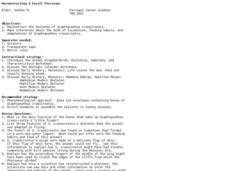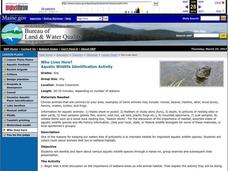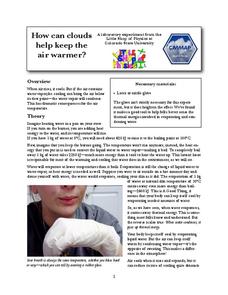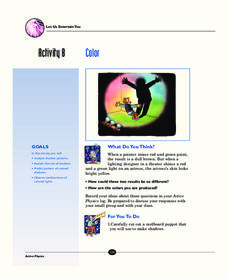Curated OER
Cancer Causes
Students explore why people get cancer. They explore human cells by taking a close examine their own. take a small sample of the epithelial cells that line the inside of their mouth. They glimpse how scientists investigate inside cells.
Curated OER
Microviewer
In this microviewer activity, students observe several types of cells. Students draw each type of cell and label the important parts. Students also answer questions relatable to the cell and the purpose for study.
Curated OER
Reconstructing a Fossil Pterosaur
Students reconstruct the skeleton of the fossil Scaphognathus crassirostis. In this fossil lesson plan, students discuss the Kingdoms of life, geologic history and the history of the skeletons of species. Students are given 20 minutes to...
Curated OER
Fishes
In this fish worksheet, learners will use fish characteristics vocabulary words to fill in the blanks of 3 statements and a crossword puzzle.
Biology Junction
Nucleic Acids
In this DNA instructional activity, learners identify the different parts of the DNA and color them. They complete 16 short answer and fill in the blank questions on DNA.
Curated OER
A Famine Glossary
For this history of Ireland worksheet, learners match eleven words from a word bank with their definitions. They finish a chart comparing their diet with that of a poor person from Ireland in 1845. Students write answers to 5 essay...
Curated OER
The Wonders of Bacteria
Students explore the evolution and features of bacteria through a series of activities. In this biology lesson plan, students collect data and graph bacterial growth. They design a brochure about bacteria's role in society.
Curated OER
An Antidote to Plagiarism
Young scholars discover how to write a research paper without directly copying written material. They read a passage, then record on the board any words that are new for them. They define these words, then organize their facts to create...
Curated OER
Were the babies switched? – The Genetics of Blood Types
Human biology or genetics learners apply their knowledge to a unique situation: two newborn baby girls being possibly switched in the hospital. The engaging activity ends with a Punnett squares assignment in which pupils...
Curated OER
Is That a Fact?
Investigate popular scientific claims and gather evidence to defend or argue against an author's stance. Writers synthesize information and compose their own "Really?" columns modeled after those found in the weekly "Science Times"...
Curated OER
Camouflage
Here is a instructional activity which incorporates ingenious hands-on activities that simulate how many animals use camouflage as a survival technique. This instructional activity clearly outlines how to implement the activities and...
Curated OER
Call Me Bond, Hydrogen Bond
As amazing as James Bond is, the surface tension of water does not allow him to walk on it! For this series of little lab activities, physical scientists play with the properties of water due to the hydrogen bonds and resulting polarity....
Curated OER
Hyperbole!
Learn all about hyperbole with this quick PowerShow presentation. The nine slides are packed full with clear examples, and there are opportunities for the audience to create some examples of their own. It's quick and informative!
Curated OER
It's Natural!
Here's a nicely designed learning exercise that will allow your young scientists to learn about common materials and products that come from nature. They also looks at synthesized products that come from a factory. This simple matching...
Curated OER
Who Lives Here?
Learners identify various aquatic wildlife species. In this biology instructional activity students collect clues about animals that live in wetland habitats. Learners rotate through several stations displaying particular animal species...
Colorado State University
How Can Clouds Keep the Air Warmer?
Condensing water warms the air around it. Young scholars consider this concept as they experiment with air temperature around evaporating and condensing water vapor. They simulate the formation of clouds to experience the associated...
Curated OER
Add the Prepositions to Complete the Story
What is a preposition? How many can you list? This worksheet has learners fill in the blanks with prepositions listed at the top of the page. Great practice opportunity!
Cornell University
Chemical Reactions
Investigate the Law of Conservation of Mass through a lab exploration. Individuals combine materials to initiate chemical reactions. They monitor for signs of reactions and measure the masses before and after the reactions for...
Cornell University
Predicting Chemical Reactions
Prove the Law of Conservation of Mass through a lab investigation. A well-designed lesson asks groups to combine materials and monitor indicators for chemical reactions. Measuring the mass of the reactants and products allows individuals...
American Museum of Natural History
T. Rex Roar Mixer
Scholars predict the sound of a tyrannosaurus rex roar with a mixing board equipped with audio from crocodiles, chickens, loon, macaw, peccary, sea lion, and bison.
Curated OER
Is It See-Through?
Explore transparancy with a science experiment on different materials. After reading an explanation on how to determine if something is see-through with a flashlight, kindergartners decide if certain materials are opaque or not....
It's About Time
Color
How can a hand puppet's shadow look like a dog? The lesson explains the science behind shadows, combining paint colors and the colors used in old televisions. Scholars use white, red, blue, and green lights to experiment with colors...
American Chemical Society
Exploring Energy
When asked to list everyday objects that require energy, most people list technology that use batteries or electricity. Through hands-on exploration, young scientists discover energy is much more than just circuitry. They play with...
Curated OER
Exercise and the Human Heart
Interpret data and learn about the human heart in one activity! After learning about the way blood flows in the body, fifth graders answer two questions about a graph displaying pulse rate. They then take their own pulses to find the...























